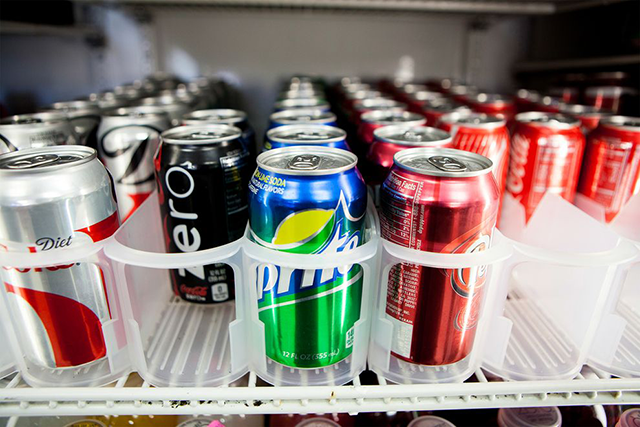Bacteria in your gut might determine whether saccharin triggers glucose intolerance.

Sugary sodas have come under fire for contributing to obesity and diabetes, but new research suggests artificial sweeteners may also raise blood sugar levels. Photograph by Sam Hodgson, Reuters
There's no such thing as a free lunch, or at least a free artificially sweetened one, a new study suggests. Saccharin and other artificial sweeteners may raise blood sugar levels – a condition the sugar substitutes aim to help prevent – by altering digestive bacteria, Israeli researchers reported on Wednesday. (Related: "What Lives in Your Gut?")
Sugar-free sodas and diet snacks abound with artificial sweeteners, invented more than a century ago as a cheaper sugar substitute. Amid an obesity epidemic, the U.S. Food and Drug Administration has to date approved six artificial sweeteners, which are widely used and roughly 500 times sweeter than sugar. These additives cut calories from foods and drinks, and are seen as precluding the elevated blood sugar, or glucose intolerance, that often precedes diabetes. (See "Sugar: Why We Can't Resist It.")
But a first-of-its-kind study suggests one reason why diet sodas and their ilk don't seem to have made much difference in the obesity crisis. The answer may lie within ourselves, or at least in the bacteria in our intestines that are exposed to artificial sweeteners, a joint team headed by Eran Segal and Eran Elinav of the Weizmann Institute of Science in Rehovot report in the journal Nature.
"This huge and poorly understood microbial world which resides within each one of us, starting from birth, has been shown to have a huge effect on our physiology," Elinav says. Although cautioning that the findings are preliminary, he says, "our results suggest the consumption of artificial sweeteners may affect the microbiome in ways that cause glucose intolerance in some people."
Over decades of study, research results on artificial sweeteners have been mixed, with some pointing to artificial sweeteners raising the risk of elevated blood sugar levels, obesity, diabetes, or other ailments, and other research suggesting lower risks. Many of the people in those studies already suffered from these conditions to some extent or ate an unhealthy diet, or both, when they enrolled, which greatly complicated the results.
A 2012 review of the safety of artificial sweeteners by the American Heart Association (AHA) and American Diabetes Association (ADA) suggested that "when used judiciously," artificial sweeteners might help people lose weight.
But the review also concluded that more research was needed on the panoply of health questions surrounding the additives. The only one that seems answered is that saccharin doesn't cause bladder cancer, a well-known fear raised by lab rat studies in the 1970s, which subsequent studies determined was unfounded, according to the National Cancer Institute.
Epidemic of Caution
In a briefing for reporters, Segal said that the study authors are "by no means" calling for people to make any changes to what they eat or drink, but are asking the scientific community to confirm the new results and reassess artificial sweeteners.
Experts reacted to the study results with a mixture of caution and interest, noting that the research was conducted largely on mice and included only seven human volunteers. And they downplayed a direct link between artificial sweeteners and the obesity epidemic. More than one-third of U.S. adults are now obese, according to the Centers for Disease Control and Prevention.
"Artificial sweeteners are associated with overweight in humans, but the obvious connection is that overweight people use them more," says New York University nutrition expert Marion Nestle, by email. "This is the first study I have seen suggesting that the connection is mediated through the microbiome. I'm not crazy about artificial sweeteners (I think they taste terrible), but this needs confirmation before taking it too seriously."
Epidemiologist Judith Wylie-Rosett of the Albert Einstein College of Medicine in New York agrees. "It would be a disaster if people with diabetes started drinking sugar-laced drinks because of this one study, so we need some caution," says Wylie-Rosett, who co-chaired the 2012 AHA/ADA review of the safety of artificial sweeteners. "It is an interesting hypothesis at this point."
Of Mice and Men's Guts
In the new study, the team began by adding one of three FDA-approved artificial sweeteners – saccharin, sucralose, or aspartame – to the drinking water of mice. The researchers compared these groups of mice with others that drank only water. Within 11 weeks, the mice drinking sweetened water had developed glucose intolerance, most notably when saccharin was added to their diet.
To see whether the mice's intestinal bacteria contributed to the problem, the team then used antibiotics to wipe out the mice's intestinal bugs and found they could return the mice's blood sugar levels to normal.
Finally, they fed fecal samples from glucose-intolerant mice to normal mice, transferring the unhealthy mice's gut bugs. The normal mice that got these fecal samples then developed glucose intolerance within six days.
Analysis of mouse gut bacteria after the experiments found a proliferation of the bugs involved in digesting carbohydrates in the glucose-intolerant mice. (Carbohydrates are found in breads, cereals, and other foods in the human diet.)
"I think this is surprising," Elinav says. He calls it "counterintuitive" that artificial sweeteners, which are not meant to be absorbed by the digestive tract, end up apparently altering its performance.
To see if the effect extends to humans, the team first looked at 381 people in a nutritional study headed by Segal. They found links between artificial sweetener use, symptoms of obesity and elevated blood sugar, and the kinds of altered gut bacteria seen in the mice.
In particular, the study noted a 20-fold increase in the numbers of Bacteroides fragilis bacteria, linked to inflammation in the gut.
Finally, as a proof of concept, the team enrolled five adult men and two adult women who didn't use artificial sweeteners in a one-week experiment. In the experiment, the volunteers ate the FDA's recommended allowance of saccharin, about 120 milligrams daily; they had their blood sugar levels checked every five minutes and underwent a daily glucose tolerance test.

Sweetener made from stevia plants, here in a research greenhouse at Michigan State University, has gained popularity as an alternative to artificial varieties. Photograph by Kevin J. Miyazaki, Redux
"Notably, even in this short-term seven-day exposure period, most individuals (4 out of 7) developed significantly poorer glycemic [blood sugar] responses," says the study. Normal mice fed fecal samples from the four human volunteers with glucose intolerance developed the same condition.
Along with a historical shift toward processed foods over the past century, the move toward artificial sweeteners "coincides with the dramatic increase in the obesity and diabetes epidemic," the study concludes. "Our findings suggest that [artificial sweeteners] may have directly contributed to enhancing the exact epidemic they themselves were intended to fight."
Microbiome Mystery
"This study reinforces the idea that what we eat directly influences our gut microbiota, which, in turn, is intimately linked to many facets of our health," says Stanford University microbiologist Justin Sonnenburg. He called for closer examination of the results, pointing to the uncertainty over the mechanism behind the changes in the gut bacteria seen in the study. (Related: "The Quantified Microbiome Self.")
For starters, when people eat artificially sweetened foods, only milligrams of the sweetener ends up in their gut, compared to most of the sugar eaten in normally sweetened foods, notes Stanford University's Christopher Gardner, another co-chair of the 2012 AHA/ADA artificial sweetener safety review. If the gut bacteria are eating artificial sweeteners, then very small amounts of the material seem to have a disproportionately large effect on the community of microbes, he says.
The missing piece in the study is a mechanism for the artificial sweeteners to directly spur a population boom in some gut bacteria and a population bust in others.
The researchers acknowledged that they don't understand how artificial sweeteners would stimulate the growth of potentially harmful intestinal bacteria. It's possible, but untested, that the sweeteners may change conditions in the gut in some way that spurs the growth of the microbes, even if the microbes are not eating the additives.
Elinav says the results also point to the very individual nature of how people respond to changes in diet, noting the three out of seven people whose blood sugar remained unaffected in the last part of the study.
"Eventually, we may be moving toward an era of personalized nutrition," he says, where individuals' diets are tuned to their digestive tract's tendencies. (Related: "Discovering My Microbiome.")
Personalized nutrition, like personalized medicine, is a hot topic among health experts, says Wylie-Rosett, but there are fairness issues to consider: "We want to see we don't move toward an era of diet haves and have-nots. Obesity, unfortunately, has a larger effect on the have-nots."
